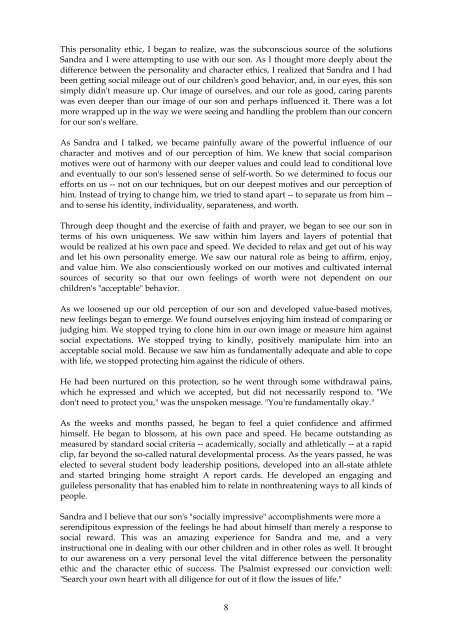Covey - The 7 habits of highly effective people
Create successful ePaper yourself
Turn your PDF publications into a flip-book with our unique Google optimized e-Paper software.
This personality ethic, I began to realize, was the subconscious source <strong>of</strong> the solutions<br />
Sandra and I were attempting to use with our son. As I thought more deeply about the<br />
difference between the personality and character ethics, I realized that Sandra and I had<br />
been getting social mileage out <strong>of</strong> our children's good behavior, and, in our eyes, this son<br />
simply didn't measure up. Our image <strong>of</strong> ourselves, and our role as good, caring parents<br />
was even deeper than our image <strong>of</strong> our son and perhaps influenced it. <strong>The</strong>re was a lot<br />
more wrapped up in the way we were seeing and handling the problem than our concern<br />
for our son's welfare.<br />
As Sandra and I talked, we became painfully aware <strong>of</strong> the powerful influence <strong>of</strong> our<br />
character and motives and <strong>of</strong> our perception <strong>of</strong> him. We knew that social comparison<br />
motives were out <strong>of</strong> harmony with our deeper values and could lead to conditional love<br />
and eventually to our son's lessened sense <strong>of</strong> self-worth. So we determined to focus our<br />
efforts on us -- not on our techniques, but on our deepest motives and our perception <strong>of</strong><br />
him. Instead <strong>of</strong> trying to change him, we tried to stand apart -- to separate us from him --<br />
and to sense his identity, individuality, separateness, and worth.<br />
Through deep thought and the exercise <strong>of</strong> faith and prayer, we began to see our son in<br />
terms <strong>of</strong> his own uniqueness. We saw within him layers and layers <strong>of</strong> potential that<br />
would be realized at his own pace and speed. We decided to relax and get out <strong>of</strong> his way<br />
and let his own personality emerge. We saw our natural role as being to affirm, enjoy,<br />
and value him. We also conscientiously worked on our motives and cultivated internal<br />
sources <strong>of</strong> security so that our own feelings <strong>of</strong> worth were not dependent on our<br />
children's "acceptable" behavior.<br />
As we loosened up our old perception <strong>of</strong> our son and developed value-based motives,<br />
new feelings began to emerge. We found ourselves enjoying him instead <strong>of</strong> comparing or<br />
judging him. We stopped trying to clone him in our own image or measure him against<br />
social expectations. We stopped trying to kindly, positively manipulate him into an<br />
acceptable social mold. Because we saw him as fundamentally adequate and able to cope<br />
with life, we stopped protecting him against the ridicule <strong>of</strong> others.<br />
He had been nurtured on this protection, so he went through some withdrawal pains,<br />
which he expressed and which we accepted, but did not necessarily respond to. "We<br />
don't need to protect you," was the unspoken message. "You're fundamentally okay."<br />
As the weeks and months passed, he began to feel a quiet confidence and affirmed<br />
himself. He began to blossom, at his own pace and speed. He became outstanding as<br />
measured by standard social criteria -- academically, socially and athletically -- at a rapid<br />
clip, far beyond the so-called natural developmental process. As the years passed, he was<br />
elected to several student body leadership positions, developed into an all-state athlete<br />
and started bringing home straight A report cards. He developed an engaging and<br />
guileless personality that has enabled him to relate in nonthreatening ways to all kinds <strong>of</strong><br />
<strong>people</strong>.<br />
Sandra and I believe that our son's "socially impressive" accomplishments were more a<br />
serendipitous expression <strong>of</strong> the feelings he had about himself than merely a response to<br />
social reward. This was an amazing experience for Sandra and me, and a very<br />
instructional one in dealing with our other children and in other roles as well. It brought<br />
to our awareness on a very personal level the vital difference between the personality<br />
ethic and the character ethic <strong>of</strong> success. <strong>The</strong> Psalmist expressed our conviction well:<br />
"Search your own heart with all diligence for out <strong>of</strong> it flow the issues <strong>of</strong> life."<br />
8


